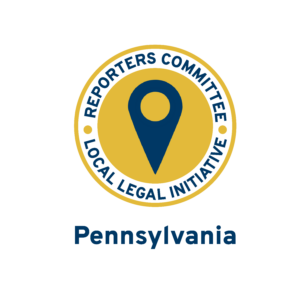Expanding local legal support for Pennsylvania journalists
A Q&A with Paula Knudsen Burke at the Reporters Committee for Freedom of the Press
 As Pennsylvania’s new Local Legal Initiative attorney, Knudsen Burke brings experience in newsrooms, advocacy and the law to provide pro bono legal services to reporters
As Pennsylvania’s new Local Legal Initiative attorney, Knudsen Burke brings experience in newsrooms, advocacy and the law to provide pro bono legal services to reporters
Journalists and newsrooms in Pennsylvania will now have access to additional legal services and support for their reporting through the Local Legal Initiative, a recent expansion of the Reporters Committee for Freedom of the Press’s pro bono resources for local enterprise and investigative journalism. Pennsylvania media lawyer Paula Knudsen Burke has joined the Reporters Committee as the Local Legal Initiative attorney for the state, where she’ll help local journalists defend their newsgathering rights, gain access to public records and court proceedings, and support reporting that holds government agencies and officials accountable to their communities.
Read on to get to know more about the Local Legal Initiative, and how Paula can help journalists and newsrooms in Pennsylvania.
Q: Pennsylvania is one of five states to receive a Local Legal Initiative attorney (the others being Colorado, Oklahoma, Oregon and Tennessee). What brought the Reporters Committee’s Local Legal Initiative to Pennsylvania, and what are you hoping this additional support will mean for journalism in the state?
Paula: More than 30 organizations, ranging from hyperlocal newsrooms and major dailies to academic and nonprofit institutions, took part in the application process for a Local Legal Initiative attorney in Pennsylvania. This really demonstrated the breadth and diversity of news organizations in the state, and the desire for collaboration among them.
The proposals outlined a number of legal challenges, especially when it comes to pursuing access to public records and datasets, that are making it harder for Pennsylvania newsrooms to produce the kind of journalism — particularly investigative reporting — that they feel their communities deserve. The applicants outlined how records requests are often denied when agencies misapply the state’s broad exemptions, and are routinely delayed, like when agencies invoke an extension intended for only complicated cases in response to even simple requests.
Pennsylvania journalists work tirelessly to bring relevant, timely information to their subscribers, readers, viewers and listeners. They shouldn’t have to add legal wrangling to their already full plates. I’m hoping that as the new Local Legal Initiative attorney for the state, I can offer some relief to strapped newsrooms and journalists, and give them a boost in needed areas, like government transparency.
Q: What kinds of legal issues are you able to help journalists and newsrooms with, and what’s the best way for someone to get in touch with you about a question or problem?
Paula: Local Legal Initiative attorneys are here to help local media defend against legal threats and lawsuits, assist with public records and court access efforts, and provide pre-publication review and other legal services.
For instance, some reporters continue to struggle with access to basic public records, such as the name, title and salary of taxpayer-funded employees. I can help journalists craft Right to Know Law requests and, depending on the case, represent them before the Office of Open Records or in related proceedings. Similarly, the Reporters Committee has deep expertise in Freedom of Information Act requests, so we’re also able to help journalists seeking information and records from federal agencies. We can also assist with things like challenging sealed court proceedings. If an important court proceeding is sealed to the public, and the case remains closed despite a journalist’s efforts, I may be able to help. I’ll also be organizing training opportunities for journalists that cover topics such as the federal Freedom of Information Act. The sessions will be held virtually for now, and I hope to organize in-person trainings when physical meet-ups are more practicable.
For journalists looking for assistance with a question or legal issue, the Reporters Committee hotline is always a great place to start. Journalists and media lawyers can contact us during normal business hours (Monday through Friday, 9 a.m.–5 p.m. ET) using our online form. Outside of normal business hours, you can reach us in an emergency — for example, if a journalist has been arrested or faces an imminent threat of arrest — by calling 1-800-336-4243. To connect with me directly, my email is pknudsen [at] rcfp.org and my phone number is (717) 370-6884.
Q: Before joining the Reporters Committee, you were a reporter for the watchdog publication The Caucus, as well as an editor, and worked in government affairs for the Pennsylvania NewsMedia Association to advocate for improvements to the state’s public records and meetings laws. How do these experiences inform your work now as a media attorney?
Paula: As a reporter, I know first-hand how frustrating it can be when government officials thwart access to basic information that should be readily available. I’ve frequently used the state’s Right to Know Law to push local and state agencies to be more forthcoming with information. I’ve also challenged officials during meetings when they have inappropriately tried to go into an executive session that should have been public under the Sunshine Act.
But it’s not just my own experiences I’m drawing on as I begin work as Pennsylvania’s LLI attorney. During my time at the Pennsylvania NewsMedia Association, I heard from journalists, editors and publishers throughout the state about their newsgathering challenges, including their frustrations with the state’s Right to Know Law. Those same stakeholders shared their experiences with legislators, through both meetings and committee testimony. I look forward to continuing to work with these groups of people — and others who are committed to a free and robust press — both in the legislature and through litigation.
There is an incredible history of amazing journalism in Pennsylvania, and I’m thrilled to be a part of helping reporters continue their vital work in our Commonwealth.
